
Ukraine International Airlines (UIA, Kyiv) does not feel a decrease in passenger traffic due to information about the active spread of coronavirus, the airline’s press service has told Interfax-Ukraine.
“There are passengers with tickets for flights to Italy who requested to re-arrange their flights for later dates. We do this as an exception to a term of two months from the original date. But there are very few of them,” the press service said.
According to UIA, in total, there were 26 such requests through the airline’s Facebook page, of which five returns were issued, and 21 tickets were reissued for other dates.
At the same time, UIA does not currently plan to limit the flight program to Italy.
As reported, the Hungarian low cost airline Wizz Air reduces the number of flights to Italy from March 11 to April 2, 2020 due to a decrease in demand because of coronavirus.

PrJSC Dyckerhoff Cement Ukraine (Kyiv) in 2019 increased its net profit by five times compared to 2018, to UAH 814.2 million.
According to a company report in the information disclosure system of the National Commission on Securities and the Stock Market regarding a meeting of shareholders scheduled for March 24, net profit per share in 2019 amounted to UAH 5.1.
Uncovered loss amounted to UAH 387.2 million, while a year earlier the company’s retained earnings amounted to UAH 1.18 billion.
Total debtor indebtedness decreased by 1.6%, to UAH 108.6 million, long-term liabilities by 21.4%, to UAH 1.32 billion, current liabilities by 38.8%, to UAH 355.5 million.
In 2019, the company increased its assets by 8.7%, to UAH 2.65 billion.
Dyckerhoff Cement Ukraine is one of the largest cement plants in Ukraine. The company is owned by Germany’s Dyckerhoff GmbH (99%).

The State Service of Ukraine for Food Safety and Consumers’ Rights Protection has temporarily banned the import of domestic and wild animals from China to prevent the entry of coronavirus into Ukraine. “To minimize the risks of introduction of the pathogen Covid-19 into the territory of Ukraine, in accordance with Articles 33 and 96 of the law of Ukraine on veterinary medicine, taking into account the recommendations set out in the OIE Terrestrial Animal Health Code, the service temporarily prohibited the import to Ukraine from China of domestic animals (dogs, cats, etc.) and wild carnivores,” the press service of the agency said.
The agency also added that according to official information from the World Organization for Animal Health (OIE) in Hong Kong (China), a SARS-CoV-2 disease of an animal (dog) was recorded.
“The State Service for Food Safety and Consumers’ Rights Protection constantly monitors the situation with animal diseases in the world,” it said.
National bank of ukraine’s official rates as of 03/03/20

Source: National Bank of Ukraine

Anti-trust agency opens case against Naftogaz for setting prices for households too high
The Antimonopoly Committee of Ukraine (AMC) has opened a case about the possible abuse of monopoly position by Naftogaz Ukrainy when setting natural gas prices for the population from November 1, 2018, the committee’s website reports.
The AMC reported that Naftogaz has special obligations to sell gas to domestic consumers (the public). At the same time, the company sets prices in this market segment based on the price of gas for industry, which it offers.
According to information available to the committee, Naftogaz set prices for industrial consumers higher than those established in a competitive environment, in particular, according to the results of electronic exchange trading on the Ukrainian Energy Exchange and on European hubs with the condition of gas delivery to the Ukrainian border (NCG).
“This may indicate the establishment by Naftogaz Ukrainy from November 1, 2018 of prices for natural gas for the population at a level that could not be established if there was significant competition in the natural gas markets,” the statement said.